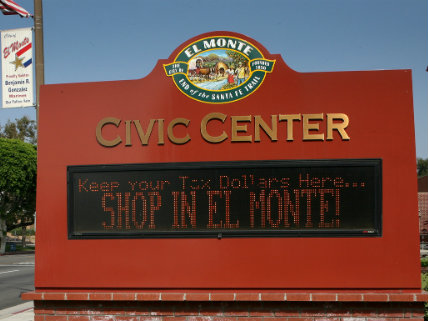California Mayor Says There's 'No Rational Justification' For City's Six-Figure Pensions
But there's not much he can do to change it, because the city signed off on the benefits in collective bargaining agreements. It's a common story.

A few weeks back, I noted the story of James Mussenden, a retired city manager from El Monte, California.
A quick recap: in a town where more than a quarter of the population is living below the poverty line, and where the median household income is a mere $32,000, Mussenden is pulling down a $216,000 annual pension (along with free healthcare and annual cost of living increases). The Los Angeles Times uncovered Mussenden's outrageous pension—which, as the paper reported, he feels awkward talking about with his golf buddies.
With retirement promises like that, it's no surprise that El Monte is dealing with one of the worst pension crises in a state full of municipal pension messes. Last year, more than a quarter of the city's budget was spent on benefits for retired public workers.
Now, Mayor Andre Quintero tells the Los Angeles Times that there's "no rational justification" for the extraordinary pensions that are busting his city's budget and enriching a few hundred former employees. Yet, because those benefits are written into the city's collective bargaining agreements, he tells the Times that it can be undone only through negotiations with unions.
As the Times put it: "El Monte's predicament reflects the deep difficulty of reining in public pension costs."
Yes, but there's more to it than that. El Monte's "predicament," like similar predicaments facing municipalities from coast to coast, is of its own making. City officials signed off on these generous pension benefits when they reached collective bargaining deals with public sector unions. El Monte's pension problems are particularly acute because of a special loophole opened by the city in 2000 allowing El Monte city employees to qualify for a second pension as county employees too.
Some 200 former city employees, including Mussenden, are legally double-dipping because of that loophole.
The problem is one of incentives. Public sector unions have a strong incentive to get the best possible benefits for their members, of course. City officials are supposed to be negotiating on behalf of taxpayers, but often times they have a stronger incentive to give in to union demands in order to maintain labor peace or to reward valuable political allies who help keep election coffers filled.
The same story plays out in small cities like El Monte and big ones like Chicago.
Adding to El Monte's predicament is the fact that courts in California (and most other states) have long held that pensions are locked-in and cannot be reduced even if a city is unable to meet the obligations.
That's one thing that might be changing. The California Supreme Court will take up a case later this year challenging that long-standing legal framework—known as the "California Rule." If the state Supreme Court upholds a lower court ruling (which upheld a pension reform signed by Gov. Jerry Brown in 2011) saying that says municipalities can cut unearned benefits for future employees, it would give places like El Monte a little bit of flexibility when it comes to paying off their debt.
Even if the Supreme Court upholds the reform, it won't affect already-retired workers like Mussenden, who will get to keep cashing his six-figure pension checks until he dies.


Show Comments (33)